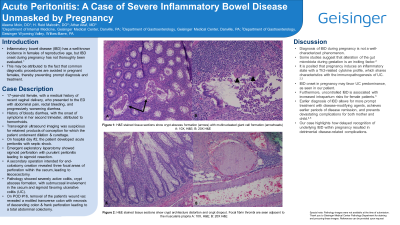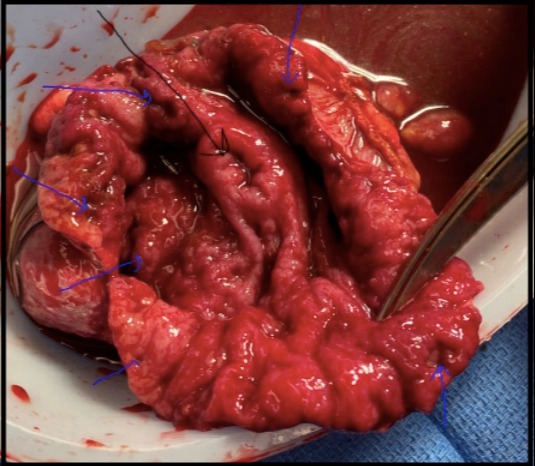Back


Poster Session C - Monday Afternoon
Category: IBD
C0437 - Acute Peritonitis: A Case of Severe Inflammatory Bowel Disease Unmasked by Pregnancy
Monday, October 24, 2022
3:00 PM – 5:00 PM ET
Location: Crown Ballroom

Has Audio

Aleena Moin, DO
Geisinger Medical Center
Danville, PA
Presenting Author(s)
Aleena Moin, DO1, Harrison R. Malcolm, JD, DO2, Athar Altaf, MD3
1Geisinger Medical Center, Danville, PA; 2Geisinger Health System, Danville, PA; 3Geisinger, Mountain Top, PA
Introduction: Inflammatory bowel disease (IBD) has a well-known incidence in females of reproductive age, but IBD onset during pregnancy has not been thoroughly evaluated. This may be attributed to the fact that common diagnostic procedures are avoided in pregnant females, thereby preventing prompt diagnosis and treatment.
Case Description/Methods: A 17-year-old female, with a past medical history of recent vaginal delivery, presented to the ED with abdominal pain, rectal bleeding, and progressively worsening diarrhea. Further history reveals the patient had been complaining of bloody diarrhea, with the onset of symptoms occurring in her second trimester; however, at that time bleeding was attributed to hemorrhoids.
Transvaginal ultrasound imaging was obtained and suspicious for retained products of conception for which the patient underwent dilation & curettage. On hospital day #2, the patient developed acute peritonitis with septic shock. Emergent exploratory laparotomy showed sigmoid perforation with purulent peritonitis leading to sigmoid resection. A secondary operation intended for end-colostomy creation revealed three focal areas of perforation within the cecum, which then resulted in ileocecectomy. Pathology specimens showed severely active colitis, and crypt abscess formation, with submucosal involvement in the cecum and sigmoid favoring ulcerative colitis (UC). Subsequent inflammatory workup with stool studies and C. Diff PCR was negative. On POD #16, removal of the patient’s wound vac revealed a mottled transverse colon with necrosis and frank perforation of the descending colon leading to a total abdominal colectomy.
Discussion: Diagnosis of IBD amidst pregnancy is not a well-characterized phenomenon. Some studies suggest that alteration of the gut microbiome during gestation is an inciting factor. According to one study, it is posited that pregnancy induces an inflammatory state with a Th2-related cytokine profile, which shares characteristics with the immunopathogenesis of UC. The same study found that IBD onset in pregnancy favored UC predominance, much like our patient.
Overall, uncontrolled IBD is associated with increased intrapartum risks for female patients. Earlier diagnosis of IBD allows for more prompt treatment with disease-modifying agents, achieves earlier periods of disease remission, and prevents devastating complications for both mother and child. Our case highlights how delayed recognition of underlying IBD during pregnancy resulted in detrimental disease-related complications.

Disclosures:
Aleena Moin, DO1, Harrison R. Malcolm, JD, DO2, Athar Altaf, MD3. C0437 - Acute Peritonitis: A Case of Severe Inflammatory Bowel Disease Unmasked by Pregnancy, ACG 2022 Annual Scientific Meeting Abstracts. Charlotte, NC: American College of Gastroenterology.
1Geisinger Medical Center, Danville, PA; 2Geisinger Health System, Danville, PA; 3Geisinger, Mountain Top, PA
Introduction: Inflammatory bowel disease (IBD) has a well-known incidence in females of reproductive age, but IBD onset during pregnancy has not been thoroughly evaluated. This may be attributed to the fact that common diagnostic procedures are avoided in pregnant females, thereby preventing prompt diagnosis and treatment.
Case Description/Methods: A 17-year-old female, with a past medical history of recent vaginal delivery, presented to the ED with abdominal pain, rectal bleeding, and progressively worsening diarrhea. Further history reveals the patient had been complaining of bloody diarrhea, with the onset of symptoms occurring in her second trimester; however, at that time bleeding was attributed to hemorrhoids.
Transvaginal ultrasound imaging was obtained and suspicious for retained products of conception for which the patient underwent dilation & curettage. On hospital day #2, the patient developed acute peritonitis with septic shock. Emergent exploratory laparotomy showed sigmoid perforation with purulent peritonitis leading to sigmoid resection. A secondary operation intended for end-colostomy creation revealed three focal areas of perforation within the cecum, which then resulted in ileocecectomy. Pathology specimens showed severely active colitis, and crypt abscess formation, with submucosal involvement in the cecum and sigmoid favoring ulcerative colitis (UC). Subsequent inflammatory workup with stool studies and C. Diff PCR was negative. On POD #16, removal of the patient’s wound vac revealed a mottled transverse colon with necrosis and frank perforation of the descending colon leading to a total abdominal colectomy.
Discussion: Diagnosis of IBD amidst pregnancy is not a well-characterized phenomenon. Some studies suggest that alteration of the gut microbiome during gestation is an inciting factor. According to one study, it is posited that pregnancy induces an inflammatory state with a Th2-related cytokine profile, which shares characteristics with the immunopathogenesis of UC. The same study found that IBD onset in pregnancy favored UC predominance, much like our patient.
Overall, uncontrolled IBD is associated with increased intrapartum risks for female patients. Earlier diagnosis of IBD allows for more prompt treatment with disease-modifying agents, achieves earlier periods of disease remission, and prevents devastating complications for both mother and child. Our case highlights how delayed recognition of underlying IBD during pregnancy resulted in detrimental disease-related complications.

Figure: Figure 1: The Ileocecal valve is designated by a black arrowhead. Blue arrows indicate various areas of ulceration within the bowel wall.
Disclosures:
Aleena Moin indicated no relevant financial relationships.
Harrison Malcolm indicated no relevant financial relationships.
Athar Altaf indicated no relevant financial relationships.
Aleena Moin, DO1, Harrison R. Malcolm, JD, DO2, Athar Altaf, MD3. C0437 - Acute Peritonitis: A Case of Severe Inflammatory Bowel Disease Unmasked by Pregnancy, ACG 2022 Annual Scientific Meeting Abstracts. Charlotte, NC: American College of Gastroenterology.
